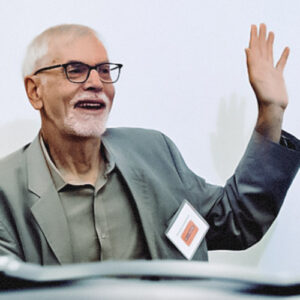Nicholas Freudenberg is a Distinguished Professor of Public Health at CUNY SPH and Founding Director and Senior Faculty Fellow at the CUNY Urban Food Policy Institute, is a true champion of promoting health and well-being in urban communities. With a wealth of experience and an extensive academic background, Professor Freudenberg is at the forefront of driving positive change in public health.
For over three decades, Professor Freudenberg has been a driving force in designing, implementing, and assessing health policies and programs aimed at improving living conditions and reducing health disparities in low-income communities, not only in New York City but also in other areas. His commitment to making a difference in the lives of marginalized communities through public health research and advocacy is truly commendable.
We are fortunate to have Professor Nicholas Freudenberg as a leader in the field of public health, working tirelessly to create a healthier and more equitable future for all & would like to extend him our gratitude for agreeing to Interview with us.
SHIVANGINI PANDEY (SP): CAN YOU SUGGEST SPECIFIC STRATEGIES OR BEST PRACTICES THAT CUNY CAN IMPLEMENT TO ALIGN ITS FOOD/BEVERAGE SERVICES WITH CLIMATE-FRIENDLY SUSTAINABILITY GOALS?
NICHOLAS FREUDENBERG (NF): To better ensure that all CUNY food services align with CUNY and the nation’s climate goals, CUNY should:
- Ensure that all CUNY water fountains are working properly and checked regularly and that on every campus it is easier to find clean free drinking water than a vending machine selling sugary beverages and water in plastic bottles.
- Ask each CUNY food service vendor serving in CUNY cafeterias to develop a plan to reduce the waste they produce each by a specific amount (e.g., 10%) and monitor their attainment of these goals.
- Ask each CUNY food service vendor to develop and post menus that feature climate-friendly products, those that use foods and beverages that contribute less to carbon and greenhouse gas emissions.
SP: HOW CAN CUNY ENSURE THAT EFFORTS TO MAKE FOOD AND BEVERAGES HEALTHIER AND MORE CLIMATE-FRIENDLY ARE INCLUSIVE AND ACCESSIBLE TO EVERYONE, CONSIDERING VARIOUS DIETARY PREFERENCES AND CULTURAL BACKGROUNDS?
NF: Ask each CUNY food service vendor to develop and post menus that feature a range of culturally appropriate and acceptable choices for student groups on that campus such as those who follow halal or kosher diets, those who are vegetarians or vegans and those who prefer, for example, Asian or Latin American or other foods. These should also be climate-friendly products, those that use foods and beverages that contribute less to carbon and greenhouse gas emissions.
SP: ONE OF THE MAIN COUNTERARGUMENTS WE HEAR IN SUPPORT OF KEEPING CUNY’S POURING RIGHTS CONTRACT WITH PEPSICO IS THE SPONSORSHIP FUNDS. THE SCHOOL IS CURRENTLY EXPERIENCING A FINANCIAL DEFICIT. CUNY RECEIVED $21 MILLION FROM PEPSICO OVER THE 10-YEAR CONTRACT, SOME OF WHICH WERE SET ASIDE FOR SUSTAINABILITY FUNDS, ATHLETICS, AND OTHER STUDENT PROGRAMS. WHAT ARE THE ETHICAL CONSIDERATIONS OF CUNY, A PUBLIC UNIVERSITY, RECEIVING CORPORATE FUNDING, ESPECIALLY GIVEN THE RECENT BUDGET CUTS?
NF: The money CUNY receives from PepsiCo is a tiny fraction of the overall budget, and so far, CUNY has not been willing to provide students, faculty, and staff with details on how they are using that money. Moreover, it is not ethical or responsible to use money for student support from a contract designed to encourage CUNY students to consume more unhealthy products and to develop brand loyalty to a company (i.e., Pepsi) that contributes significantly to the global burden of dietary diseases and ocean pollution. CUNY can and should do better.
SP: WHAT RESOURCES AND STRATEGIES ARE YOU USING TO RAISE AWARENESS AND BUILD POLITICAL WILL ACROSS CUNY’S CAMPUSES TO ACHIEVE YOUR GOAL OF ENDING CUNY’S EXCLUSIVE CONTRACT WITH PEPSICO?
NF: The specific goal is to end the pouring rights contract with CUNY and the broader goal is to ensure that the food CUNY offers its students, faculty, and staff supports their well-being, their food security, and their health. In my view, this is more important than using food sales to generate revenues for food companies or for CUNY. We are seeking to educate the CUNY community about these issues, to invite their participation in creating and improving CUNY’s campus food programs, and to mobilize students, faculty, and staff to urge CUNY leaders to bring our voices about food vendor choices and campus food programs into the decision-making process. That is how an accountable university operates.
ABOUT INTERVIEWEE

Nicholas Freudenberg,Distinguished Professor of Public Health at the CUNY Graduate School of Public Health and Health Policy and a Founding Director and Senior Faculty Fellow at the CUNY Urban Food Policy Institute. His research and scholarship focus on diet-related chronic diseases, urban health, the evaluation of complex urban interventions, and the role of the food industry in health and disease. For 30 years he has assisted NYC organizations to plan, implement, and evaluate policies, programs, and advocacy campaigns to improve community health and reduce health inequities, and he was the cofounder, with Janet Poppendieck, of the NYC Food Policy Center at Hunter College. He holds a PhD and a Master’s degree in Health Policy and Management from the Columbia University School of Public Health.
